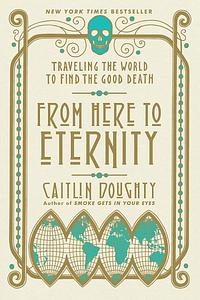Take a photo of a barcode or cover
3.71k reviews for:
From Here to Eternity: Traveling the World to Find the Good Death
Caitlin Doughty
3.71k reviews for:
From Here to Eternity: Traveling the World to Find the Good Death
Caitlin Doughty
informative
reflective
fast-paced
First finding Caitlin Doughty's books was like a revelation. I'm far from the first person to compare these two bestselling death authors' books but I'll say it anyway: for years I'd been searching for something that would fill the void left when I finished [b:Stiff: The Curious Lives of Human Cadavers|32145|Stiff The Curious Lives of Human Cadavers|Mary Roach|https://i.gr-assets.com/images/S/compressed.photo.goodreads.com/books/1347656489l/32145._SX50_.jpg|1188203] and Doughty's work does that and more.
But there is a clear difference. Mary Roach is a science writer, and Caitlin Doughty is a mortician: a death professional. It seems like Doughty is the rare person who's found her calling: to undo the damage that the modern funeral industry has done to our death culture, and to provide humane funerary experiences for the people she serves in the meantime. [b:From Here to Eternity: Traveling the World to Find the Good Death|38212121|From Here to Eternity Traveling the World to Find the Good Death|Caitlin Doughty|https://i.gr-assets.com/images/S/compressed.photo.goodreads.com/books/1533310414l/38212121._SY75_.jpg|55079092] is clearly the work of someone who is so knowledgeable and so passionate about her subject. This book has so much heart. There's humor here, too, and so much fascinating information, never without immense respect for everyone Doughty writes about, living or dead.
A passage I loved from a chapter on natural decomposition:
Another quote I really liked:
One disclaimer is that while Doughty covers several interesting death cultures and rituals, including one in Appalachia and another in Colorado, this book doesn't explain in detail the culture we're measuring against: modern U.S. funeral culture and its origins. If that interests you, she touches on this in her first book, [b:Smoke Gets in Your Eyes & Other Lessons from the Crematory|25189315|Smoke Gets in Your Eyes & Other Lessons from the Crematory|Caitlin Doughty|https://i.gr-assets.com/images/S/compressed.photo.goodreads.com/books/1436549658l/25189315._SX50_.jpg|39962326].
tl;dr I loved this book and I hope Doughty keeps writing. This is a rare book that I think will stay on my shelf for a long time.
But there is a clear difference. Mary Roach is a science writer, and Caitlin Doughty is a mortician: a death professional. It seems like Doughty is the rare person who's found her calling: to undo the damage that the modern funeral industry has done to our death culture, and to provide humane funerary experiences for the people she serves in the meantime. [b:From Here to Eternity: Traveling the World to Find the Good Death|38212121|From Here to Eternity Traveling the World to Find the Good Death|Caitlin Doughty|https://i.gr-assets.com/images/S/compressed.photo.goodreads.com/books/1533310414l/38212121._SY75_.jpg|55079092] is clearly the work of someone who is so knowledgeable and so passionate about her subject. This book has so much heart. There's humor here, too, and so much fascinating information, never without immense respect for everyone Doughty writes about, living or dead.
A passage I loved from a chapter on natural decomposition:
"humans are so focused on preventing aging and decay—it's become an obsession. [. . .] So decomposition becomes a radical act. It's a way to say, 'I love and accept myself.'"
There is a freedom found in decomposition, a body rendered messy, chaotic, and wild. I relish this image when visualizing what will become of my future corpse.
When deathcare became an industry in the early twentieth century, there was a seismic shift in who was responsible for the dead. Caring for the corpse went from visceral, primeval work performed by women to a "profession," an "art," and even a "science," performed by well-paid men. [. . .]
Maybe a process like recomposition is our attempt to reclaim our corpses. Maybe we wish to become soil for a willow tree, a rosebush, a pine—destined in death to both rot and nourish on our own terms."
Another quote I really liked:
For his trouble in showing me around Barcelona, poor Jordi had been rewarded with multiple close encounters with the dead. As we ate what seemed like a fourteen-course dinner in the city, I inquired what the day had been like for him. He thought, and replied that "when your bills come due, you have to pay them. At my company, I pay my bills. Here at this restaurant, I pay my bill. It is the same with feelings. When the feelings come, the fear of death, I must feel those feelings. I must pay my bill. It is being alive." (emphasis mine)
One disclaimer is that while Doughty covers several interesting death cultures and rituals, including one in Appalachia and another in Colorado, this book doesn't explain in detail the culture we're measuring against: modern U.S. funeral culture and its origins. If that interests you, she touches on this in her first book, [b:Smoke Gets in Your Eyes & Other Lessons from the Crematory|25189315|Smoke Gets in Your Eyes & Other Lessons from the Crematory|Caitlin Doughty|https://i.gr-assets.com/images/S/compressed.photo.goodreads.com/books/1436549658l/25189315._SX50_.jpg|39962326].
tl;dr I loved this book and I hope Doughty keeps writing. This is a rare book that I think will stay on my shelf for a long time.
Fascinating stories of death rituals around the world.
“Ever since daddy died you’re always reading about death!” My daughter is not wrong. Historically I’ve read a great deal about the emotional aspects of grief and loss. The moving forward, the interpersonal struggles, and the emotionally stunted American culture and how that impacts the grief process.
This book, however, discussed various death rituals and practices worldwide, and taught how different cultures “do” death. I truly enjoyed learning this information and now have a deeper appreciation for the wide variety of death practices that exist. This book depicts different death practices in a way that honors the cultures mentioned, gives room for grief and loss, and maintains dignity for all involved. Beautifully done.
My favorite passage:
“There was magic to each of these places. There was grief, unimaginable grief. But in that grief there was no shame. These were places to meet despair face to face and say, "I see you waiting there. And I feel you, strongly. But you do not demean me."
This book, however, discussed various death rituals and practices worldwide, and taught how different cultures “do” death. I truly enjoyed learning this information and now have a deeper appreciation for the wide variety of death practices that exist. This book depicts different death practices in a way that honors the cultures mentioned, gives room for grief and loss, and maintains dignity for all involved. Beautifully done.
My favorite passage:
“There was magic to each of these places. There was grief, unimaginable grief. But in that grief there was no shame. These were places to meet despair face to face and say, "I see you waiting there. And I feel you, strongly. But you do not demean me."
adventurous
informative
inspiring
reflective
fast-paced
I really enjoyed listening to the audio book of this. Hearing modern day funeral rituals and how different cultures care for their dead is fascinating, even if Doughty just scratched the surface in this telling of her travels.
I rarely write reviews but wow, this book was life-changing (pun sort of intended). I am forever grateful to the author
hopeful
inspiring
reflective
medium-paced
I enjoyed learning these new perspectives on dealing with death, mourning and ritual from different cultures.
funny
Didn't like it as much as her other book, but still funny and informative



